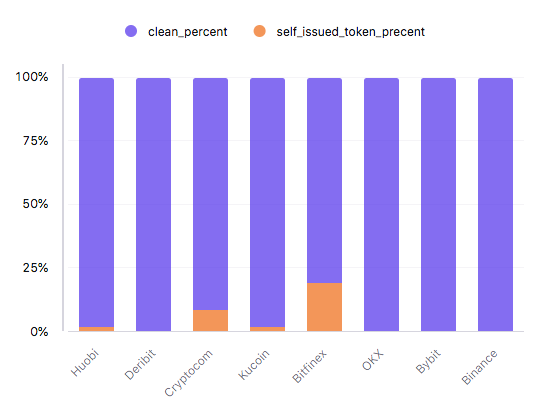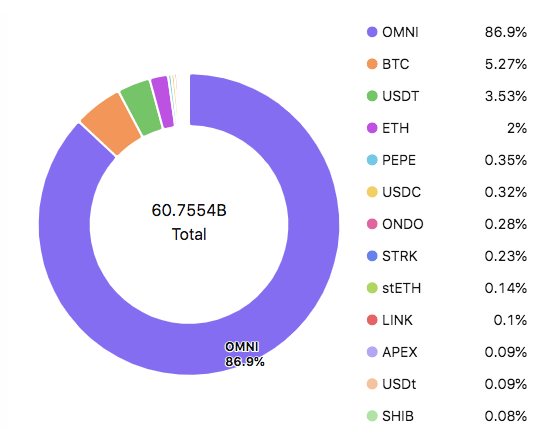Research: Major exchanges hold mostly altcoins in their Proof of Reserves
Even after FTX some cryptocurrency exchanges like ByBit and KuCoin continue to have significant exposures to altcoins or self-issued tokens which might be considered a risk
In 2024, two years after the infamous meltdown of the FTX exchange in 2022[2], only few crypto exchange platforms have yet publicly declared their Proof of Reserves[1] .
Today BitYields presents you with a detailed analysis of some of the publicly declared assets of selected few exchanges, based on our own on-chain research about Huobi, Deribit, Crypto.com, KuCoin, Bitfinex, OKX, ByBit, Binance.
BitFinex and Crypto.com have 20% and 10% of their reserves stored via self-issued coins
First, we would like to provide an overview of exchanges with significant reserves of self-issued tokens (see Image 1):

It is surprising to see that Bitfinex's self-issued "utility" token Unus Sed LEO ($LEO)[4] consists of 20%+ of its total reserves[3]. Meanwhile Crypto.com's Cronos tokens ($CRO) also appears to constitute almost 10% of the reserves of the exchange.
Reserves: Crypto.com and Bitfinex prefer Bitcoin, while KuCoin and Huobi have major exposure to altcoins
Bitfinex and Crypto.com, despite having larger share of their own coins in their reserves, at least compensate by holding solid proportions of Bitcoin in their reserve portfolios (see Image 2 and Image 3):


It is in general considered that holding Bitcoin (and sometimes Ethereum or Stablecoines) is better for portfolio stability, due to their bigger market capitalizations and not-so-volatile nature. However, this is not the case with altcoins.
What is interesting (and concerning) about Huobi and KuCoin is however that the majority of the reserve holdings of these exchanges consist of altcoins (although not self-issued), which puts really at question the stability index of the platform to any potential altcoin shocks (see Image 2). Precisely, Huobi has 39.58% as of 23th of July 2024 in their reserve funds, while


Perhaps, however, there's no surprise that the ultimate "winner" in the "altcoin reserve holdings" competition is no one else but KuCoin. The obscure exchange has been touted as the paradise for alt-coin flippers, yet by having less than 10% of its reserves in Bitcoin or Stablecoins the overall liquidity of the platform is questionable at best.
Surprise: 86% of ByBit's reserves are in $OMNI token

Another surprising discovery during our research was that $OMNI coin currently constitutes more than 86% of the proof of reserves of ByBit[3]. This puts to question whether ByBit is not currently susceptible to a liquidity panic attack just like FTX (Editor's note: Chief reason for the bank run of FTX was the announcement that the platform stores the majority of its assets in its self-issued FTT token, which quickly plummeted after the news' release[3]).
Conclusion: Lessons from FTX are not incorporated by everybody
We find it baffling how even after the collapse of FTX still major reputable exchanges might rely so much to altcoins in their very reserve portfolios. We urge these exchanges to reconsider their portfolio allocations, as altcoins are extremely easy to be targeted and exploited by market manipulation and panic attacks, potentially destroying invaluable assets values.
References:
- Crypto.com, Proof of Reserves, 23.07.2024: https://crypto.com/proof-of-reserves
- Investopedia, The Collapse of FTX: What Went Wrong With the Crypto Exchange?, 06.06.2024: https://www.investopedia.com/what-went-wrong-with-ftx-6828447
- Original research of BitYields: https://bityields.net
- Bitfinex, Unus Sed LEO, 23.07.2024: https://support.bitfinex.com/hc/en-us/articles/360023342674-Unus-Sed-LEO-LEO
- Crypto.com, Cronos, 23.07.2024: https://crypto.com/price/cronos